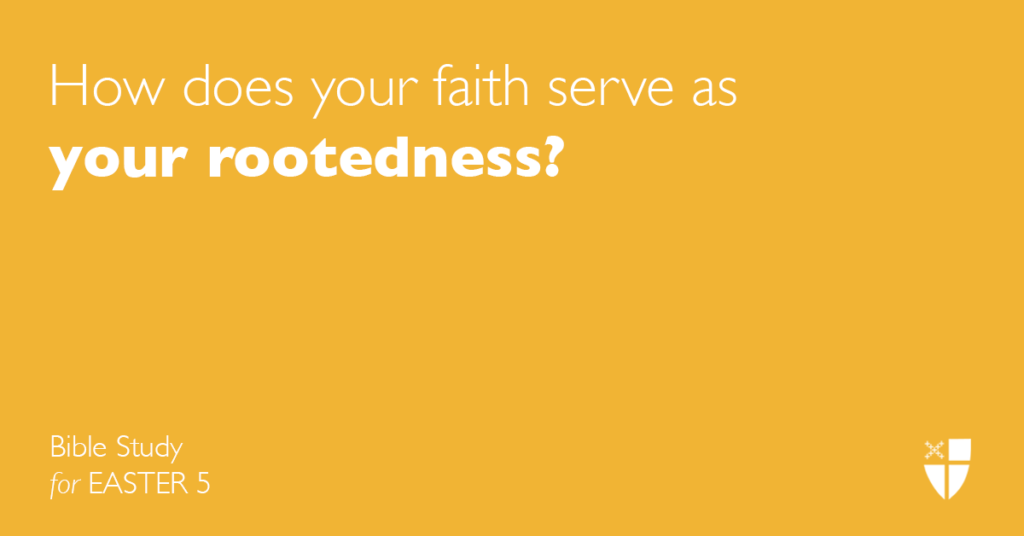This page is available in: Español
Bible Study: Easter 5 (B) – 2021
May 02, 2021
RCL: Acts 8:26-40; Psalm 22:24-30; 1 John 4:7-21; John 15:1-8

Acts 8:26-40
There are two key points to note in this passage from Acts. The first centers on the Ethiopian eunuch. This is a marginalized person; not only is he a stranger on the road from Jerusalem to Gaza, but he is also a eunuch, a person without his masculinity in a place that prizes masculine dominance and power – the Roman world. Through this story of conversion by teaching and baptism, God is saying that the Good News about Jesus is for all people, including those marginalized in society.
The second key point is the movement of the Spirit of God, a theme throughout the whole book of Acts. In this text, there is an urgency in how the Spirit of God moves. The Spirit of God is seen three times in this passage. First, an angel of the Lord told Philip to go to the road from Jerusalem to Gaza. Second, the Spirit told Philip to engage with the Ethiopian eunuch (Notice how Philip approaches the stranger, not by just walking up to him, but rather by running – there is urgency when the Spirit of God moves us). Finally, the Spirit of God suddenly took Philip away. When the Spirit of God is flowing through us, as it did in Philip, the Spirit has other places for us to go when we are done.
- How do you approach the strangers in your land or the marginalized in your town?
- How is the Spirit of God moving you today?
- What is the Spirit-led urgency in your life?
Psalm 22:24-30
It is difficult to talk about the second part of Psalm 22 without saying something about the first part of Psalm 22. There is a shift in this psalm at the 22nd verse. Before that, the writer pleads to God for help: “My God, my God, why have you forsaken me?” And who among us has not been crying out to God for help during this pandemic?
The second part of this psalm reminds me of praising God for being resurrected on the inside. It is a reminder to me that, lest we forget so quickly, we are Easter people. There is both praise of God and promise, as in verse 26: “All the ends of the earth shall remember and turn to the Lord, and all the families of the nations shall bow before him.” Not only is there the hope in God’s saving actions today, but also in years to come, as seen in verse 30: “They shall come and make known to a people yet unborn the saving deeds that he has done.” In praise, this psalm names the promise and hope that God gives us all.
- How have you shifted from pleading to praise?
- Think about the promise and hope that God gives you. How do you proclaim those things?
1 John 4:7-21
We use the word “love” in many ways in our society – “I love pizza!” “Falling in love,” “making love,” telling each other “I love you,” and so forth. This scripture gets at our theological core as Christians – God is love and God shows us love by sending Jesus into the world so that we can live anew through his life, death, and resurrection. It also demonstrates some key points regarding love. 1 John tells us that if we love one another, then we are very near God because “God lives in us.” Another key point is that if we say we love God, then we must also love our brothers and sisters – yes, even when our brothers and sisters are different from us in how they look, how they live, and how they think.
- How do you practice loving brothers and sisters who are different from you?
- Share a time when you experienced God living in you when you loved another.
John 15: 1-8
I have been involved in a Benedictine Way group for the past eight years. Each month, we study the Rule of Benedict and discuss how Benedictine spirituality is impacting our life. The Benedictine value of stability rang through this text from the Gospel of John. According to the book Sacred Rhythms – The Monastic Way Every Day, stability is about cultivating rootedness and a shared sense of vision. The sentence “Abide in me as I abide in you” is about rootedness in Christ. This rootedness is both external and internal; Benedictine stability is about staying where you are planted and experiencing what is happening inside you as you process what is happening outside you. Abiding in Christ is all about letting Jesus into your daily thoughts and visions, just like the life-giving water that runs through the grapevines and into the branches.
- How do you abide in Christ throughout your day?
- How does your faith serve as your rootedness?
This page is available in: Español
Don’t forget to subscribe to the Sermons That Work podcast to hear this sermon and more on your favorite podcasting app! Recordings are released the Thursday before each liturgical date.
Receive Free Weekly Sermons That Work Resources!
This page is available in: Español


